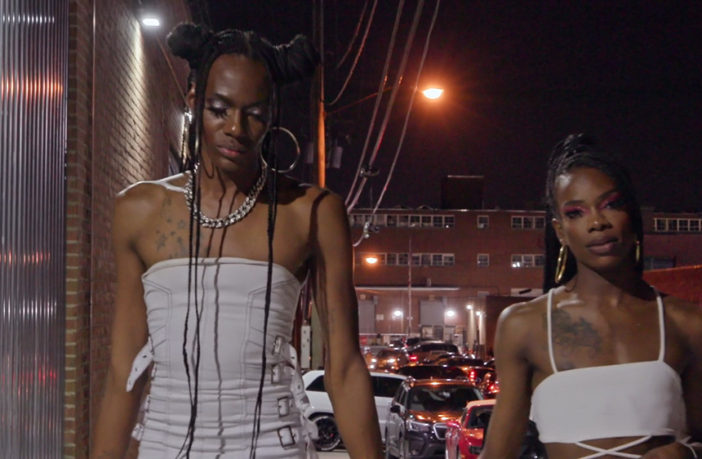MnM, the new film directed by Twiggy Pucci Garçon, celebrates the joyful and unapologetic personas of Mermaid and Milan, two members of the nonbinary community that have formed a tight bond. “They are two of a kind,” he declares to EBONY. “Their sisterhood and bond was instant from the moment they met.” Serving up a story of siblinghood and self-discovery with a touch of ballroom realness, MnM could make a splash on January 23, 2024, by receiving a nomination in the short documentary category for the upcoming 96th Academy Awards.
MnM is part of Multitude Films’ “Queer Futures” series, a collection of short documentaries by emerging directors. “It’s all about different aspects of what our perspective is on a queer future right now,” Garçon shares. “I immediately wanted to make a project about Mermaid and Milan…as members of the House of Garçon, which I’m an international mother, but also of my personal chosen family beyond the house. I felt their story could inspire so many other people to know that they have their person, their twin flame, somewhere in the world.”
Here, Garçon shares more about the film and his directorial process.
EBONY: You, Mermaid and Milan are all members of the House of Garçon. How did it come into being?
Twiggy Pucci Garçon: My gay parents, Shannon and Whitney, and other family members created the House of Garçon. I’m a part of the leadership legacy, so I hold a mother title now. The house was created in April 2008 to take a different approach to the ballroom community. The ballroom scene has been around for nearly a century. Many original members of this house were members of several other houses. We wanted to be intentional about the type of family bond and safe space that we were forming—what we wanted our brand and reputation to be and how intentional we wanted to be about our roles outside of competing, our advocacy, entertainment and role in representing the Black and LGBTQ community more broadly.
EBONY: How long did it take you to put this project together?
We had five production days across two cities: Washington, D.C. and New York City. The project, from inception to completion in post-production, took about a year.
In the film, Mermaid says that drag is for everyone, all genders and all types of people. How can everyone embrace drag?
I think in order to understand Mermaid’s quote and her point, you have to be able to understand gender, which is expansive and crosses a spectrum. We’re often taught and conditioned to believe that gender is binary, that there’s one thing or another thing, but any of us can be in any place across the gender spectrum. The idea of drag is simply to perform a different gender. Because any of us can be anywhere on the gender spectrum, we can also perform something different.
What are some of the other messages you hope the film conveys?
One of the main messages is just how radical it is to be and show up as your true self every day and how courageous it is to do that, no matter who you are. I think another is that we’re moving towards a very queered future with a more expansive point of view on gender, sexuality and how we identify ourselves and that gender is expansive, period. A third thing is having a more extensive point of view and way of thinking about family. We are given families by blood, but we also have the opportunity to choose who our family is, and some are hybrids. Milan’s family is a hybrid of blood and chosen family. Mermaid’s mother, Caroline, is very active and supportive of Mermaid and Milan. We’re often taught and told to believe that Black, West Indian and Caribbean families aren’t supportive of their LGBTQ children. These are prime examples of supportive families.
In the movie, you see Mermaid’s mom using the wrong pronouns for Milan, who pointed it out. Mermaid’s mom self-corrected and identified at that moment that she used the wrong pronouns. That’s beautiful to see. The grace that was given in that particular moment is one that we often don’t see extended to folks who are trying to learn and get it right. That’s one of my favorite moments in the film.
What advice do you give to people struggling to express their identity?
My advice to folks is to take their time and give themselves the grace to figure it out. Language is always changing, and we are always changing. And so we have to be patient with ourselves around the words we’re using to describe ourselves and other people but also to be patient with ourselves on our journey of self-discovery and self-actualization.



